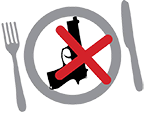Leading up to publication of GFKT’s Loose Guns report in 2017, a series of workshops in Arabic and Hebrew were held in November-December 2016. They exposed diverse groups and activists to report findings, bringing the report “to life” as a galvanizing intervention. A core group of some 20 activists from about 14 organizations responded to the workshops with a decision: To conduct a joint process of action-oriented study on small arms activism and small arms realities.
The Living Without Guns study group, as participants titled it, committed to in-depth learning which, it hoped, should eventually also indicate paths of action and advance a broad-based, diversified, feminist and civil society gun control movement. The group provided a first-ever framework for coordinating focused gun control work across a spectrum of Palestinian-led and Jewish-led feminist organizations and activists from Israel.
Examining world-wide disarmament and gun control interventions, the action-oriented study group held video conferences with activists from South Africa, Guatemala and Australia. It also studied the strategies and practices of organizations in Brazil and northern India. The compelling models encountered fed comparative discussions of small arms realities in Israel: the gun violence plaguing Palestinian society and the extreme normalization of guns in Jewish society.
A first year of self-guided study culminated in a joint group decision to extend the program for another year, now focusing on local small arms realities and potential solutions. Year one of the study process was planned and led by a steering team of three volunteer activists joined by the coordinators of GFKT and of its home organization, Isha L’Isha. Towards year two, the baton was passed on to four other volunteers, who were again joined by the two coordinators. Each study meeting ran for 4 hours and included a break for a shared light lunch. For the most part, discussions were in Hebrew.
The process set out to nurture “smart,” knowledge-based activism which, in turn, should generate further, more specific knowledge. All study meetings were documented, mainly by two participant researchers who took part in the group and concurrently initiated academic research on comparative attitudes to firearms in diverse parts of Israeli society. Another participant in the group conducted a study of perceptions of firearms and masculinity in Palestinian society in Israel. Materials prepared for each discussion were archived, along with research from abroad introduced in the context of particular study sessions (some studies were summarized or excerpted in Hebrew). A new firearms law proposed by the government in the course of the study process led the group to frame and guide the research and writing of a Gender Analysis of the proposed law (to be formally publicized when discussions of the proposal are resumed in the Knesset). Among multiple outcomes, the process also engendered two parallel testimony projects, conducted in Arabic and in Hebrew by sister organizations and focusing on women’s experiences of guns in Jewish and in Palestinian society in Israel.
Today, the understanding acquired by the Living Without Guns group is feeding directly into an unprecedented, popular protest against gun violence in Palestinian society in Israel. Group members have drafted a list of concrete steps that are vital for stemming this violence. Now circulating widely among individuals and organizations, the list aims to provide a powerful but diffuse protest with solid, achievable goals and distinct addressees. We plan to gather a large segment of civil society behind the list, presenting it to government and to the broader public as a representative set of strong demands.
Also, now in process is the compilation of a reader comprising the materials, documents and analyses collected in the course of two years of study.
Initial workshop series:
Nazareth, May 13 2016 (about 20 participants): Sponsored by Member of Knesset Aida Touma-Sliman, representatives of Palestinian and Jewish feminist groups from Israel convened to discuss violence in Palestinian society in Israel.
Nazareth, June 7, 2016 (5 participants): Planning focused work on gun violence.
Tel Aviv, November 18, 2016 (24 participants); Nazareth, November 30, 2016 (7 participants): Parallel discussions (in Hebrew and Arabic) of the findings of GFKT’s report, “Loose Guns.”
Haifa, December 9, 2016 (about 30 participants): Themes: The separate but interconnected small arms realities reflected in the workshops; First samples of successes in gun control activism world-wide.
Living Without Guns – First year:
Steering team: Shahira Shalaby, Tamar Hager, Ruth Preser, Tzameret Hershco (Isha L’Isha Coordinator), Rela Mazali (GFKT Coordinator).
Meeting minutes: Sarai Aharoni, Amalia Saar (participant researchers), Rela Mazali.
Meeting materials: Researched, prepared and presented by rotating group members
February 24, 2017: Theme: Gun Free South Africa
Video meeting with Director Adele Kirstein and Communications Director Nurahn Ryklief
June 7, 2017: Theme: Rio de Janeiro favela mothers' network
Report from an interview with Giselle Martins (Rela Mazali).
July 7, 2017
Themes:
- Manipur women gun survivors’ network – Report on the network based on a web-search; Report on contacts with co-founder Binalakshmi Nepram (Shir Ben-Or and Melodi Baron; Shahaf Weisbein);
- Report from a strategy and networking meeting of activists from Israel, Palestine and countries around the world from communities effected by Israeli arms exports. The meeting looked at how Israeli arms industry effects the different societies and at ways to challenge this together (Rela Mazali).
September 11, 2017: Small arms legislation and control in Australia
Themes: Report on new US research on correlation of gun law and gun crime; Report on current small arms policies in Israel (Rela Mazali); Small arms legislation and control in Australia – Video meeting with Rebecca Peters, former Chair of National Coalition for Small Arms Control in Australia.
November 17, 2017
Themes: Peace work in Myanmar and Gun Control action in Guatemala – Video meeting with Cate Buchanan, Technical Advisor for Nyein (Shalon) Foundation, Myanmar.
May 4-5, 2018: Summary workshop
Themes – What we covered (Hana Amoury); First findings of local research-in-progress (Sarai Aharoni, Amalia Saar); Where we’re going (group discussions).
Living Without Guns – Second year:
Steering team: Sahar Vardi, Shahrazad Odeh, Hana Amoury, Meisa Irshaid (GFKT Legal Advisor), Tzameret Hershco (Isha L’Isha Coordinator), Rela Mazali (GFKT Coordinator).
Meeting minutes: Sarai Aharoni, Amalia Saar (participant researchers), Noga Kadman (GFKT Development Coordinator) + rotating group members.
Meeting materials: Researched, prepared and presented by rotating group members and non-member experts.
August 31, 2018
Themes: Motives for gun ownership – self-defense, masculinity and more (Shahrazad Odeh; Shihab; Amalia Saar; Sarai Aharoni).
November 16, 2018
Themes:
- Gender Analysis of Proposed Firearm Law (Smadar Ben Natan)
- Policing in Israel’s Arab Society (Yehudit Ilany).
January 18, 2019
Themes: Learning from survivors (personal testimonies from three gun violence survivors).
March 29, 2019
Themes:
- Economic interests behind in small arms proliferation in Israel (Sahar Vardi)
- Questions on working with survivors (Rela Mazali).
August 9, 2019
Themes:
- Community struggles against gun violence in Palestinian society in Israel (Ruth Levin-Chen, Ola Najami)
- The roots and (rich) fruits of our knowledge building (Hana Amoury)
- Where we go from here (Nabila Espanioly).
Issues and Facts
Articles & Reports
Our Activities

Would you like to get our updates?
Subscribe to our mailing list


